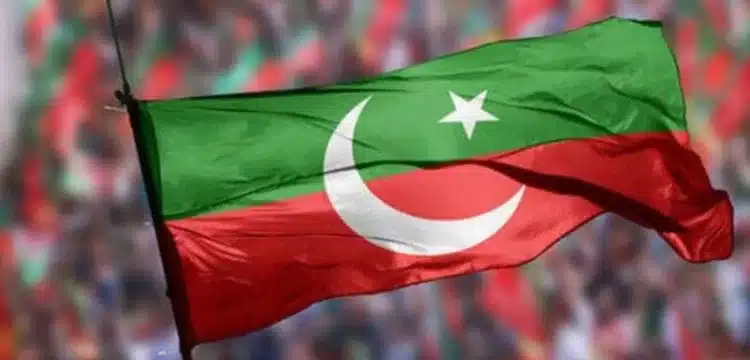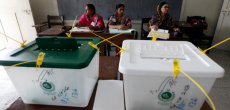[vc_row][vc_column][vc_column_text dp_text_size=”size-4″]The Pakistan Tehreek-e-Insaf (PTI) has officially declared the deferment of its intra-party elections, initially slated for February 5. The decision to postpone was attributed to the significant involvement of party leaders and workers in the ongoing general election campaign. The unexpected announcement of holding the intra-party elections on February 5 was made a day prior, but the impracticality of conducting them just before the general elections became evident due to the extensive commitments of leaders and workers in their respective constituencies.
In light of these circumstances, PTI has opted to reschedule its internal elections to occur shortly after the conclusion of the general elections on February 8. The party intends to release a new timeline for the intra-party elections, allowing for a more feasible and focused electoral process. This decision came after consultations with the chief organiser, where concerns about the practicality of holding elections amid the ongoing general election activities were raised. The party members also expressed a collective desire to postpone the intra-party elections, given their active engagement in electioneering activities within their regions.
Read more: PTI Schedules Intra-Party Elections For February 5
Earlier, the party’s federal election commissioner had issued the election schedule, indicating that all registered voters as of January 31 were eligible to participate in the voting process. Information regarding the contesting panels and election rules was made available on the official PTI website under the Election Rules, 2020.
The initial plan outlined a polling schedule for February 5, spanning from 10 am to 5 pm. Nomination papers were to be submitted to the party’s central secretariat or official website from February 1 to 2, with a deadline for filing set for February 2 at 10 pm. However, the revised timeline for the intra-party elections will accommodate the shifting priorities and engagements of party members during the critical period leading up to the general elections.
In essence, the decision to defer the intra-party elections reflects the party’s commitment to a more pragmatic and organized approach, acknowledging the challenges posed by the simultaneous conduct of both intra-party and general elections. This strategic adjustment aims to ensure a smoother electoral process, considering the dynamic and demanding nature of the political landscape leading up to the crucial general elections on February 8.[/vc_column_text][vc_column_text dp_text_size=”size-4″]To promote the exploration of tight gas in a technically and commercially viable manner, the Government of Pakistan has introduced the Tight Gas (Exploration & Production) Policy, 2024. The policy aims to incentivize both local and foreign Exploration and Production (E&P) companies to invest in unconventional hydrocarbons, recognizing the unique challenges associated with extracting optimum production from tight gas reservoirs. Unlike conventional wells, tight gas reservoirs require drilling multiple wells, leading to increased production costs. The policy addresses these challenges, encouraging the oil and gas industry to invest in unconventional ventures.
The extraction of value from tight gas reservoirs poses significant challenges, requiring state-of-the-art technologies and substantial investments in processes such as seismic acquisition, drilling, reservoir stimulation, and Field Development Plan (FDP). The policy acknowledges the longer recovery cycle and aims to bridge the demand-supply gap by providing a fair pricing regime compatible with market realities. The incentives of the policy apply to gas discoveries qualifying as “Tight Gas” under existing and future licenses and agreements.
Read more: Whats Causing The Gas Price Surge in Pakistan?
The pricing policy offers a 40 percent premium on the respective zonal price of the Petroleum (Exploration and Production) Policy 2012 for tight gas reserves. The incentive price is applicable to all tight gas discoveries under existing and future licenses, concessions, leases, and development and production leases. The provisional incentive price is notified once the Initial Third-Party Certification confirms the discovery as tight gas, with the final incentive price determined after the grant of Development and Production Lease.
Royalty is set at 12.5% of the value of petroleum at the field gate, and operating losses can be carried forward for up to fifteen years. Abandonment costs follow the provisions of the Finance Act 2010, and windfall levies are applicable as per the Petroleum Policy 2012. Other fiscal levies are not duplicated if both conventional and tight gases are produced from the same lease.
The policy allows for the suspension of production for up to one year, subject to technical and economic justifications, and the remittance of proceeds abroad follows the provisions of the Petroleum Policy 2012. The policy may be reviewed after five years, with specific provisions exempting the equipment and machinery used by the services sector from customs duty or other duties to incentivize the transfer of technology.
In case of disputes, the operator or the Working Interest Owner (WIO) may make representations to the Petroleum Division within 30 days from the date of the final decision by the Authority regarding the determination of tight gas under the policy.[/vc_column_text][/vc_column][/vc_row]











